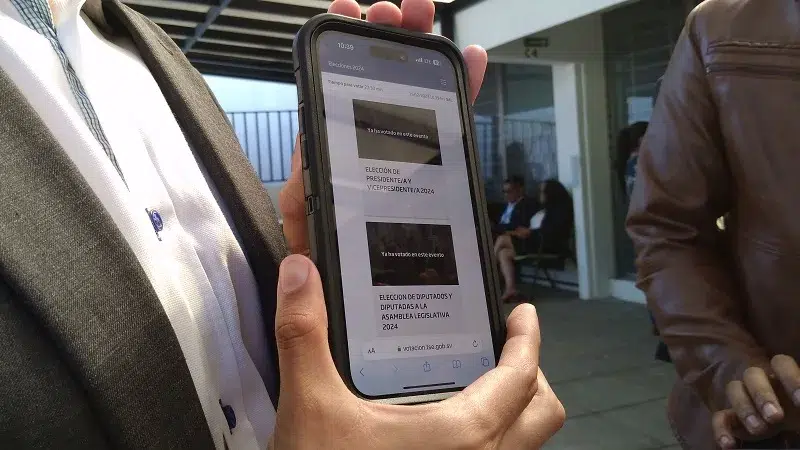With the start of overseas voting via the Internet on January 6, 2024, the citizen initiative Votante is asking the Supreme Electoral Tribunal (TSE) to provide information and materials so that citizens, academia, social organizations, computer experts, and political parties can scrutinize the technical solution implemented by the company INDRA.
In a statement released this Friday through its social networks, the initiative also urges the TSE to make public the reports of computer technical tests and audits carried out to date, and those that will be executed in the following days “so that they can be reviewed by the general population and communities of computer specialists.”
They also hope there will be openness to citizen oversight during the 30 days that the remote Internet voting system will be enabled for the elections of the Presidency, Vice Presidency, and legislative deputies of the Legislative Assembly.
The Votante initiative points out that the process of implementing Internet electronic voting has been characterized by a lack of information about the technical characteristics of the system, limited participation of social organizations, universities, or computer communities in the surveillance and technical scrutiny, and delays in the design and implementation.
Moreover, they criticize the process that the TSE followed for the awarding and contracting of the company providing the technological solution, in this case, INDRA.
“Emergency contracting mechanisms were used which, as can be seen in the public procurement file, did not merit or did not have sufficient grounds to opt for a route in which competition was discarded,” said Carlos Palomo, from Votante.
He emphasized that if there is any abnormality in the process, the TSE must inform what contingency measures will be adopted in the face of vulnerabilities, system failures, or impediments that limit voting for any range of time.
Eduardo Escobar, from Acción Ciudadana and also a member of Votante, expressed concern that there is not enough public information about the technological solution.
“This is worrying, in the sense that we do not know if the aspects that were mentioned that could be problematic for voting abroad have been resolved, such as the issue of double voting, identity impersonation. We do not know about all these aspects because there is no information, whether there is an acceptable and tolerable level of security for the voting process,” he said.
Similarly, he indicated that the TSE’s audit plan has not been disclosed.
Votante pide al TSE publicar informes de pruebas técnicas y auditorías del voto electrónico
Ante el inicio de la votación desde extranjero por la modalidad de Internet este 6 de enero de 2024, la iniciativa ciudadana Votante pide al Tribunal Supremo Electoral (TSE) que brinde información e insumos para que la ciudadanía, academia, organizaciones sociales, expertos informáticos y partidos políticos puedan escrutar la solución técnica implementada por la empresa INDRA.
En un comunicado difundido este viernes por sus redes sociales, la iniciativa también insta al TSE a hacer públicos los informes de pruebas técnicas informáticas y de auditoría realizadas hasta la fecha, y las que se ejecuten en los siguientes días “para que puedan ser revisadas por la población en general y comunidades de especialistas informáticos”.
También esperan que haya apertura a la veeduría ciudadana durante los 30 días que estará habilitado el sistema de votación remota por Internet para las elecciones de Presidencia, Vicepresidencia y diputaciones de la Asamblea Legislativa.
La iniciativa Votante señala que el proceso de implementación del voto electrónico por Internet se ha caracterizado por la ausencia de información sobre las características técnicas del sistema, escasa participación de organizaciones sociales, universidades o comunidades de informáticos en la vigilancia y escrutinio técnico, los retrasos en el diseño e implementación.
Además, critican el proceso que llevó el TSE para la adjudicación y contratación de la empresa que brinda la solución tecnológica, en este caso INDRA.
“Se utilizaron mecanismos de contratación de emergencia que, según puede constatarse en el expediente de compra pública, no ameritaba o no tenía fundamentos suficientes para optar por una vía en la que se desechara la competencia”, dijo Carlos Palomo, de Votante.
Destacó que en caso que exista alguna anormalidad en el proceso, el TSE debe informar cuáles son las medidas de contingencia a adoptar ante vulneraciones, fallas del sistema o impedimentos que limiten la votación por algún rango de tiempo.
Eduardo Escobar, de Acción Ciudadana y también miembro de Votante, externó la preocupación que no hay suficiente información pública sobre la solución tecnológica.
“Eso es preocupante, en el sentido que no sabemos si se han solucionado los aspectos que se mencionaron que podrían se problemáticos para la votación en el exterior, como por ejemplo el tema de doble votación, suplantación de identidad. Todos estos aspectos no conocemos, porque no hay información, si hay un nivel aceptable y tolerable de seguridad para el proceso de votación”, expresó.
De la misma forma, indicó que no se ha divulgado el plan de auditorías establecido por el TSE.

